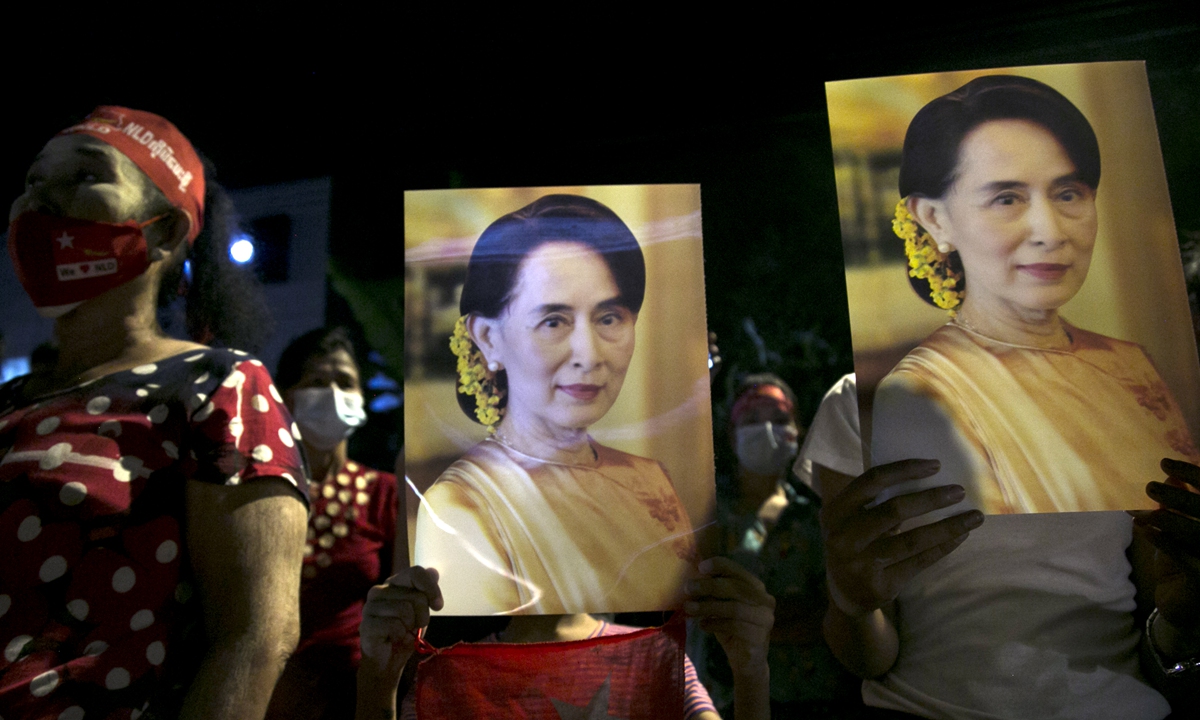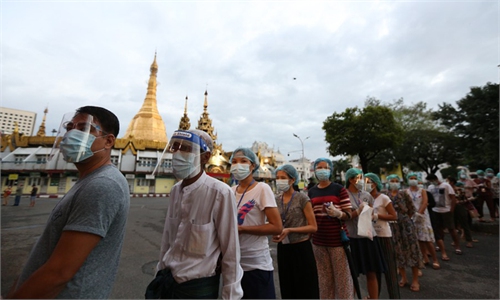
Supporters of the National League for Democracy (NLD) party hold up portraits of Aung San Suu Kyi in front of the party's headquarters in Yangon on Sunday. Photo: AFP
The article was translated by Zhang Yuzheng of East China Normal University.
Sunday was the last polling day of 2020 Myanmar general election. Despite the impact of the COVID-19 epidemic, a large number of voters proactively participated. According to current statistics, the National League for Democracy (NLD) has won a landslide victory, and is expected to win even more seats in parliament than it did in 2015.
The Union Solidarity and Development Party (USDP) has just won 15 seats as of Wednesday night. The relationship between the USDP and the military remains doubtful. This is one of the reasons why most Myanmar people choose the NLD.
If there is no major accident, the NLD will win this election again and form government alone.
Nowadays, many Myanmar people still optimistically expect Myanmar State Counselor Aung San Suu Kyi to lead Myanmar's transformation and embark on the road of democracy and sustainable development. However, in 2020 economic stagnation caused by the COVID-19 epidemic and ethnic issues, such as the Rohingya crisis, have overshadowed optimism.
The NLD's victory will help promote Myanmar's development. However, for a developing country like Myanmar, which is undergoing political transformation, maintaining stability and continuity of domestic and foreign policies is very important and necessary.
The NLD government will still face a series of problems in the next five years. These include economic development, the Rakhine State issue, national reconciliation, constitutional amendment, and dealing with political corruption, among others.
For Myanmar's economic development, foreign investment is particularly important. With the improvement of people's living standards, the requirements for infrastructure in electric power supply, transportation, medical care, and education are also increasing. Due to limited financial resources in Myanmar, it is unable to invest large amounts of capital in infrastructure. At present, Myanmar's investment in transportation and infrastructure has accounted for 3 percent of GDP, most of which are loans from foreign governments or international organizations.
Myanmar needs to make efforts to eliminate the influences of political populism, radical environmentalism and resource nationalism. Additionally, it needs to act in accordance with the laws of the market economy and international standards in order to enhance Myanmar's overall competitiveness.
Regarding the Rakhine State issue and national reconciliation, Myanmar needs to work hard to promote the peace process through political dialogues. The main ethnic groups in Myanmar need to provide more opportunities for political participation, abandon extreme Burmese nationalism, and reduce religious discrimination.
Ethnic minorities need to strengthen their political identity with the country and abandon nationalist ideology. Only in this way can Myanmar effectively promote the construction of social integration and achieve harmony between ethnic and religious groups, as well as restore robust domestic stability and peace. If Myanmar makes greater progress in achieving national reconciliation and religious harmony, it will lay a solid foundation for further political transformation. Moreover, political and social reforms will provide sustainable impetus for Myanmar's economic and social development.
In terms of punishing corruption, Myanmar needs to improve its legal system, strengthen the functional construction of the Anti-Corruption Commission, and increase the efforts to build a clean government and rectify the investment environment. In also needs to effectively enhance public legal awareness, and crack down on corruption caused by collusion between officials and business people.
With regard to diplomacy with the US and other Western countries, this election shows the indifferent relations between the NLD government and the US. US Secretary of State Mike Pompeo issued a statement, claiming "we are concerned by the large number of unelected seats constitutionally reserved for the military; the disfranchisement of groups including Rohingya; cancellation of voting in parts of several states and regions," and call on "all on all relevant authorities to ensure tabulation of votes and resolution of complaints is undertaken in a transparent and credible manner." But ironically, compared with the messy situation of the US presidential election, the general election in Myanmar ended smoothly and the process was stable with everyone respecting the results.
The NLD government and the US government once had a "honeymoon period." However, after the Rohingya crisis in 2017, the US and other Western countries withdrew multiple awards awarded to Suu Kyi and sanctioned Myanmar military officers. Myanmar considered this as a gross interference in its internal affairs, and many Myanmar people's favorable impression toward the West began to decline. It is unlikely that the US will comprehensively improve its relation with Myanmar in the short term.
The author is a professor at Center for China's Neighbor Diplomacy Studies and School of International Studies, Yunnan University.

